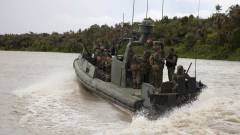A 16-hour full-blown international drama dropped it’s curtain without any major blowback on Wednesday after Iran’s Islamic Revolutionary Guard Corps (IRGC) released 10 detained US navy personnel, after holding them overnight on the charges of entering Iranian territorial waters illegally.
The arrest of the sailors came days before a landmark deal agreed to between Iran and world powers to freeze Tehran’s nuclear programme is expected to go into force. The IRGC is typically seen as a hardline opponent of President Hassan Rouhani’s more moderate government, which engineered the deal but has had little choice to fall in behind it after the negotiations were endorsed by Iran’s Supreme Leader Ayatollah Ali Khamenei.
The IGRC, which is largely responsible for Iran’s nuclear research, is also expected to benefit financially from the lifting of sanctions under the pact in return for a halting of Tehran’s nuclear programme. But the lifting of sanctions is what is due to begin with the pending implementation, and observers say this incident could throw a wrench in the works.
Iran’s armed forces chief, Major General Hassan Firouzabadi, said the incident should demonstrate Iranian strength to “troublemakers” in the US Congress, which has sought to put pressure on Iran after the nuclear deal.
The capture of the navy sailors was quickly seized on by US opponents of the deal as the latest in a series of provocations by Tehran since the deal was agreed, which include aggressive attempts to wield power in its immediate neighborhood and ballistic missile tests that the UN charged violated a Security Council resolution.
At a presidential campaign rally on Tuesday, Republican frontrunner Donald Trump, who accuses President Barack Obama of being weak on foreign policy, described the incident as “an indication of where the hell we’re going”.
“This kind of openly hostile action is not surprising. It’s exactly what I and so many others predicted when President Obama was negotiating the nuclear deal with Iran — that it would embolden their aggression towards the United States and our allies in the region,” Arkansas Republican Senator Tom Cotton told Blitzer on “The Situation Room.”
The rising tensions between Iran and other regional powers and the US also may play into a volatile political environment inside the country ahead of crucial elections in the Islamic Republic next month for the country’s parliament, the Majlis, and a powerful body called the Assembly of Experts that has the power to appoint the supreme leader.
The IRGC, the Islamic Republic’s praetorian guard, is highly suspicious of US military activity near Iran’s borders and many senior officers suspect Washington of pursuing regime change in Tehran.
Last month, the US Navy said an IRGC vessel fired unguided rockets near the aircraft carrier USS Harry S Truman in the Strait of Hormuz, a critical shipping route for crude oil that connects the Gulf to the Indian Ocean. Iran denied the vessel had done so.
Back in 2007, Iran captured 15 British sailors and marines in the Persian Gulf and accused them of trespassing in Iranian territorial waters before releasing them almost two weeks later.
Source: Dhaka Tribune









